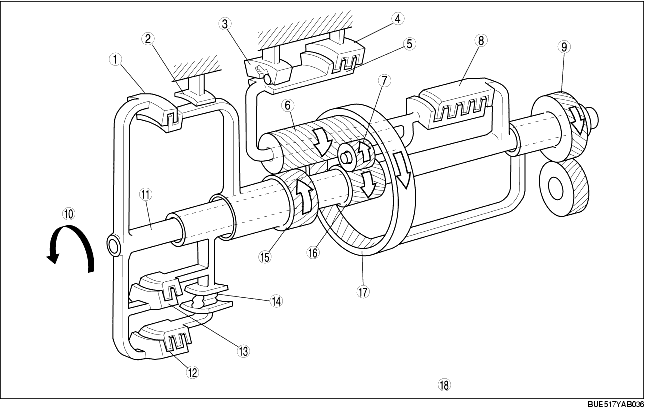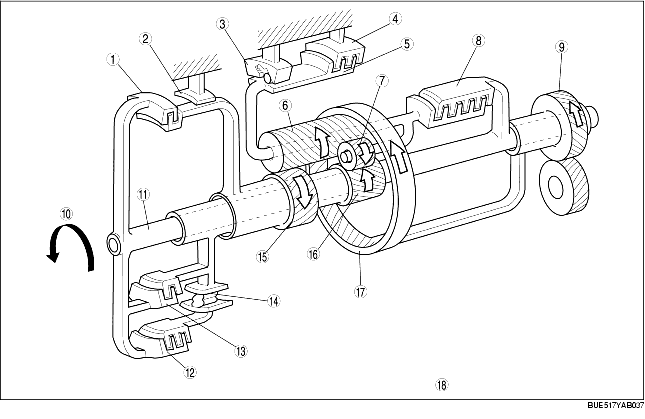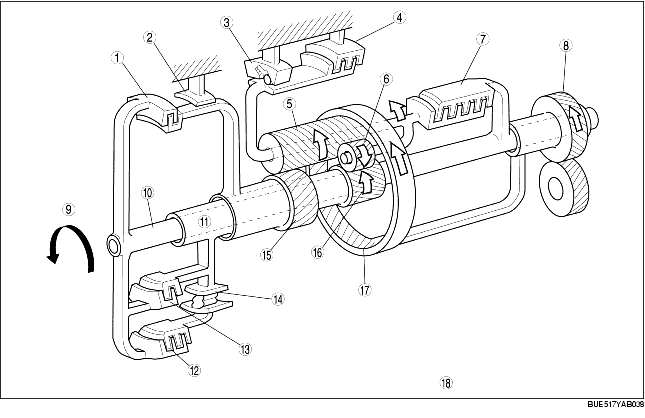
• The driving force of the turbine shaft is transmitted to the reverse and forward drum. None of the clutches are operating, so this force is not transmitted to the output gear. Therefore, the vehicle does not move.
• The output gear is locked because the output shell is mechanically locked by the parking pawl. (P position)

.
• The driving force of the turbine shaft is transmitted to the reverse and forward drum, and then to the large sun gear through the reverse clutch, causing the large sun gear to rotate counterclockwise.
• The long pinion gear of the planetary gear does not revolve around the large sun gear because the planetary carrier is locked by the low and reverse brake.
• As a result, the large sun gear causes the long pinion gear to rotate clockwise.
• This rotation causes the internal gear to rotate clockwise, followed by a clockwise rotation of the output gear. This driving force is transmitted to the driving wheels.

.
• The driving force of the turbine shaft is transmitted to the reverse and forward drum, and then to the large sun gear through the reverse clutch, causing the large sun gear to rotate counterclockwise.
• The long pinion gear of the planetary gear does not revolve around the large sun gear because the planetary carrier is locked by the low and reverse brake.
• As a result, the large sun gear causes the long pinion gear to rotate clockwise.
• This rotation causes the internal gear to rotate clockwise, followed by a clockwise rotation of the output gear. This driving force is transmitted to the driving wheels.

.
• The driving force of the turbine shaft is transmitted to the reverse and forward drum and then to the one-way clutch 1 outer race through the forward clutch. One-way clutch 1 transmits this driving force to the small sun gear, causing the gear to rotate counterclockwise.
• The internal gear, integral with the output gear, does not rotate because of the load of the stopped vehicle. The one-way clutch 2 prohibits the planetary carrier from revolving around the sun gear clockwise together with the clockwise rotation of the large sun gear. As a result, the long pinion gear of the planetary gear rotates counterclockwise and causes the internal gear to rotate counterclockwise by overcoming the load of the stopped vehicle.
• The output gear rotates counterclockwise, and the driving force is transmitted to the driving wheels.
• During deceleration, the small sun gear rotates at a higher speed than the turbine shaft, causing one-way clutch 1 to freewheel. As a result, reverse torque from the driving wheels is not transmitted to the engine, so the engine brake does not operate.
• During deceleration, engine braking operates by the coasting clutch engagement. (1 and 2 ranges only)

.
• The driving force of the turbine shaft is transmitted to the reverse and forward drum and then to the one-way clutch 1 outer race through the forward clutch. One-way clutch 1 transmits this driving force to the small sun gear, causing the gear to rotate counterclockwise.
• The large sun gear is locked by the 2-4 brake band and thus does not rotate. The long pinion gear revolves around the large sun gear counterclockwise while rotating on its own axis in the same direction, causing a counterclockwise rotation of the internal gear. As a result, the output gear rotates counterclockwise. This driving force is transmitted to the driving wheels.
• During deceleration, engine braking does not operate because one-way clutch 1 freewheels, similar to driving in D range first gear.

.
• The drive force of the turbine shaft is transmitted to the reverse and forward drum and causes the small sun gear to rotate counterclockwise through the forward clutch, one-way clutch 1 and coasting clutch.
• The large sun gear is locked by the 2-4 brake band and thus does not rotate. The long pinion gear revolves around the large sun gear counterclockwise while rotating on its own axis in the same direction, causing a counterclockwise rotation of the internal gear. As a result, the output gear rotates counterclockwise. This driving force is transmitted to the driving wheels.
• During deceleration, the coasting clutch is engaged, making engine braking available.

.
• The driving force of the turbine shaft is transmitted to the reverse and forward drum and causes the small sun gear to rotate counterclockwise through the forward clutch, one-way clutch 1 and coasting clutch.
• However, during start-up of the 2GR to 3GR shifting the coasting clutch is not yet engaged. Thus, the driving force uses the forward clutch and one-way clutch 1 for the counterclockwise rotation of the small sun gear. This driving force is also transmitted to the planetary carrier through the 3-4 clutch, making it rotate counterclockwise.
• As a result, because the small sun gear and the planetary carrier rotate counterclockwise at the same speed, the short and long pinion gears revolve integrated with the small and large sun gears and internal gear instead of rotating on their own axis.
• The driving force caused by this motion is transmitted to the driving wheels through the output gear. During deceleration, engine braking operates by coasting clutch engagement.

.
• The driving force of the turbine shaft is transmitted through the 3-4 clutch to the planetary carrier to rotate it counterclockwise. The large sun gear is fixed by 2-4 brake band engagement; therefore, the long pinion gear revolves around the sun gear counterclockwise while rotating on its own axis in the same direction, and the short pinion gear revolves around the sun gear counterclockwise while rotating clockwise on its own axis, causing the small sun gear to rotate counter clockwise.
• As a result, the internal gear rotates counterclockwise, and this driving force is transmitted to the driving wheels.
• The driving force of the turbine shaft is also transmitted to the one-way clutch outer race through the forward clutch.
• The rotation speed of the small sun gear (that of the one-way clutch inner race) is higher than that of the one-way clutch outer race. Thus, one-way clutch 1 freewheels and does not transmit power. During deceleration, the engaged 3-4 clutch transmits the rotation speed of the internal gear and planetary carrier to the engine side and engine braking is obtained.

.